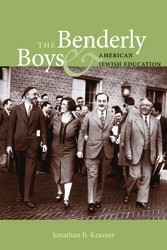The Jewish bookshelf contains many volumes of reflection on the weekly Torah portion, and A Year with Mordechai Kaplan by Rabbi Steven Carr Reuben is a worthy addition to that growing collection. In his latest book, Rabbi Reuben offers his own personal reflections on the weekly portion while also introducing the reader, in small doses, to Kaplan’s thought and influence on Jews of all denominations.
In a brief Introduction, Reuben surveys Kaplan’s impact on twentieth century American Jewry— as a thought leader, theological revolutionary, and institution builder. “Kaplan viewed Judaism as the all-encompassing totality of the life of a Jew … he constantly challenged us as contemporary Jews to incorporate as much of Jewish tradition as we experience as relevant and meaningful with the best contributions of modern Western civilization in order to create an ever-evolving Judaism of the future,” Reuben writes. Each chapter of A Year with Mordechai Kaplan is a commentary on the weekly Torah portion or reading for a holiday. Within each chapter, Reuben further divides his commentary into several parts. The first part is a close reading of a verse. The second introduces Kaplan’s thoughts on a theme from the portion. The third part shares the author’s personal reflections from his career in the rabbinate. In the commentary on Purim, Reuben shares Kaplan’s understanding of Purim as “championing the human ability to take action that changes the course and fate of our history,” an idea that supports Kaplan’s denial of a supernatural God. In Reuben’s personal reflection, he shares the inspiring story of Francisco Carillo, who was wrongly incarcerated and spent twenty years fighting for his release. Upon release, he was able to overcome his anger at false imprisonment and now works as a counselor in the juvenile justice system. Reuben admires Carillo’s humility and resilience and likens his story to the story of Purim. In this way, Reuben intersects his and Kaplan’s thoughts into a concise, meaningful, and timeless lesson.
The author makes clear that his book is not designed to be read cover to cover, but “to be read and used each week to help illuminate the Torah portions one at a time.… My hope is that, all together, these will stimulate reader contemplation, elicit personal reflections that further illustrate or develop the ideas in this book, and motivate readers to make our tradition’s profound teachings ever more meaningful and impactful in their own lives.” A Year with Mordechai Kaplan does just that, while at the same time sharing the wisdom, passion, and insights that Kaplan can continue to offer us into the next phase of Jewish life.






